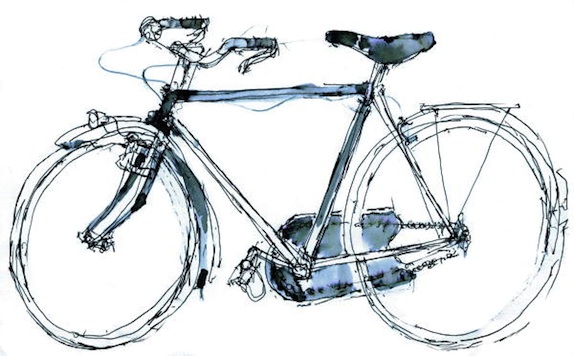And The Weak Suffer What They Must

I was in a Carlton bookshop, browsing but not buying. I opened “And the weak suffer what they must” at a random page and read compulsively. Written by Yanis Varoufakis after resigning as Greece’s Finance Minister, this was no economic treatise and certainly no dry text book. It turned out to be politically and historically thrilling.
The page that found me was about Yanis’s visit to his first wife’s step grandfather in the traditional village. He had been a Nazi collaborator who exploited the execution of the local beauty's father and husband, a partisan,to get her for himself. There's Greek tragedy here from the start.
There’s more to it than that bald sentence - please read the book for yourself - but putting it so bluntly apocryphizes the history and complexity of Greece, indeed of Europe. Reading that chapter there in the autumn of middle class Carlton, I realised that the more I know the less I understand.
Varoufakis is a superb storyteller with both stylistic flair and an ability to analyse the complex psychology of European and neoliberal politics. He also grasps history in both it's detail and its broad sweep. The narrative thread here is basically his time as Greek Finance Minister trying to negotiate his country’s future against the power of the EU itself, the European Central Bank (ECB) and the International Monetary Fund (IMF). The plot is a sequence of astonishing twists and turns driven by the cunning politics and hubristic folly of the key EU players, as well as US leaders going back to Nixon.
The title, incidentally, is taken from Thucydides, the ancient Greek historian and general: "Right, as the world goes, is only in question between equals in power, while the strong do what they can and the weak suffer what they must.” This was the reply of the Melians to powerful Athens in 416 BC - that justice is not a matter of what the powerful can do by force, that there are moral realities built into human history that cannot be overridden by violence. Varoufakis exposes how power tries to avoid moral accountability, so that whilst the strong often do as they will and the weak often suffer what they must, unjust power is nevertheless wrong and self-destructive.
Like a thriller
Varoufakis starts with a memory of his childhood, hiding under a red blanket with his parents to listen to a banned radio station. This was Greece in 1967, a military dictatorship. The program was a German-based news broadcast and young Yanis saw the Germans then, once his country’s conquerors and oppressors, as a beacon of freedom.
From the first page he weaves together Greece and Germany, freedom and fascism, justice and greed, debt and guilt, all in the overarching pattern of modern capitalism. What could have ended up a boring self justification emerges as a masterful and ultimately hopeful thriller. You just can't put it down! If only school economics was like this.
Starting with the problems of his own country - Greece, although he also has dual citizenship as an Australian! - and the plight of the eurozone, Varoufakis builds a history of the entire global financial order. He’s more than simply an “anti-austerity” Marxist as he makes clear that today’s economic system was created by millions of people, workers, merchants, managers and investors, to meet a basic need: to ensure that money maintains its value.
Over the past century and and a half inflation was the great bogeyman of capitalism’s development, from the capitalist point of view. Inflation destroys assets. Victoria Bateman explains “As children, we were all told that money doesn’t grow on trees; the reality is that if it does – if money is printed heedlessly – it turns out to be worthless. We would then soon devolve into having to provide directly for ourselves by means of self-sufficiency and, where possible, barter, swapping apples for oranges over the fence in an effort to make sure we have what we need to stay alive – a “good life” that, it turns out, is not so good after all."
Varoufakis neatly describes how "two world wars and the ravages of hyperinflation left Europe without a reliable currency. The immediate solution was to fix European currencies to the dollar and, in turn, to make the dollar convertible to gold. This provided an anchor for European currencies, with the US steering the ship. Unfortunately, as European growth outstripped that of the US, America was no longer able to carry the weight of other currencies and so broke the fixed exchange rate system. It is in the wake of the downfall of this Bretton Woods system that the euro was later born.”
- see Victoria Bateman’s review in The Times Higher Education Supplement
Unfortunately, as Varoufakis succinctly explains, when sovereign currencies are fixed to one another but expand at different rates, trade imbalances soon arise: exporting failure here counters exporting success over there. If the weaker country can’t adjust it’s currency downwards, making its economy more competitive, it has to rely on the depression of wages and prices to do the job, and austerity is painful. Alternatively, it can borrow from the surplus economies to plug the gap, compiling a debt hangover. Argentina, Greece, Spain . . .
Eurozone bailouts to Greece have not helped, what they have really done is protect the lenders: the bankers who would have otherwise had their fingers burned by debt default. The money “going to Greece” has not gone to the people or even to the Government but to the same big banks that created the crisis by reckless lending in the first place. But the repayments must then be met by the Government which ultimately takes it from the people in taxes and charges and by slashing services.
A further problem for Greece has been that it does not have a sovereign currency but uses the euro which is controlled and dominated by the strongest european economy - Germany. Greece has been bound hand and foot to a crisis it did not itself make. Forget all that rubbish about long lunches, generous pensions and overstaffed workplaces. Even where those things have happened they have not been the cause of this endemic debt crisis.
But all this economic analysis, clear as it is, is not the book’s main strength in my opinion. As Paul Tyson has said in his review (on open democracy.net) “Varoufakis’ book has something made-up stories can only mimic; the texture of real history.”
In real history, false illusions are typically more influential in the circles of power and popular conceptions of normality than is truth. That’s why, in real history, truth usually seems stranger than fiction. And yet, Varoufakis suggests, truth will have the last say, no matter how hard “the powers of illusion and convenience seek to keep the dream alive by helping us to stay asleep.”
It’s the “texture” that lifts Varoufakis’ work above the run-of-the-mill political and economic confusion. The stories like the red blanket or the fascist grandfather, or his first press conference with German Finance Minister Schauble. In that case the Greek offered an olive branch in the form of their common horror of Nazism but the German took it as an insult.
Which raises another thread in this book, which Varoufakis calls “ghosts of a common past,” namely the constantly lurking nazi spectre. In Greece the neo-nazis (he says they are not “neo”) have claimed one third of the parliamentary seats. The index refers to nazism or fascism thirty three times. The Greek nazi-style Golden Dawn get eight references.
Modern history as it was
Varoufakis’ earlier book, The Global Minotaur, outlined the origins of Europe’s modern crisis, starting with the social-democratic/keynesian post war period, and quite a bit of that is reprised here in And the weak suffer … which he calls a sequel. The economy post war was structured by the Bretton Woods agreement and the linking of the US dollar to gold, which lasted till 1971. But the US was not prepared to let its dominance slip in order to generate a truly self-balancing global economy and rejected Keynes’ original plan to construct a truly international currency and a genuinely international set of surplus and deficit rebalancing institutions. They used the dollar as the world’s default currency, controlled international institutions such as the IMF and the World Bank (Varoufakis’ footnotes are particularly illuminating, indeed can be read as a treatise in itself) and employed their massive trade surplus to invest in Germany and Japan and recreate Europe and Asia – politically and economically – as “The Free World” in something like their own image.
This worked through to 1971 when Nixon took the US off the gold standard - they didn’t have enough gold to cover the dollars being spent on the Vietnam War, nuclear armament and the space race. They were running a deficit economy characterised by “stagflation.”
The Bretton Woods agreement broke and all the cards were thrown into the air. According to Varoufakis “America expelled Europe from the dollar zone.” The European powers - remember ordinary people had little say in any of this - regrouped by fumbling towards the euro, which was born officially in 1999 and practically in 2002. Meanwhile international capital regrouped itself to solve the stagflation crisis (i.e. to generate more surplus value, as Marxists would say - and Varoufakis is definitely a Marxist) by financialisation and international capital flow. Economic rationalism, neoliberalism and all the rest of it stem from this time, and the US as the host country for so much international capital was able to maintain global dominance as a deficit economy.
I might say here that entrancing as I find his book, Varoufakis does not explain this period of history as convincingly as David Harvey does, for example in his Youtube videos such as RSA ANIMATE: Crises of Capitalism But he’s back on track with the crisis of 2008 and it’s aftermath. As he says, the Wall Street collapse set off global chain reaction that Europe’s flimsy monetary union was never designed to cope with. In particular the austerity-based German-led response to financial crisis has led to disaster, causing widespread deflation across the whole zone not just in Greece. Even mainstream economists like Paul Krugman now proclaim austerity a failed strategy
Quantitative easing
Varoufakis’ grasp of the relationships between power, illusion and reality is shown in his discussion of Quantitative Easing, introduced by the European Central Bank (ECB) and the Bundesbank to the Eurozone, but not Greece, in 2015. He explains Quantitative Easing (QE) thus: When things go wrong financially and no one will borrow money, even with interest rates at zero, then the troubled nation’s central bank can buy debts from commercial banks in order to prevent interest rates from going negative and causing the total implosion of the banking sector. Japan did this in the 1990s and the US did it in the aftermath of 2008. With QE, the central bank deposits money into accounts for the floundering commercial banks in exchange for their debts. The central bank simply creates the money on computerised accounts. These “are just digital numbers that the central bank conjures up and adds to the commercial bank’s account, held at the central bank.” (p187)
The supposed purpose of QE is to provide the big banks with the courage to lend money to real investors so that the productive economy can be stimulated by investor spending and then by wage earner consumption. In theory this will return the economy to health.
This was meant to be Keynes’ “extraordinarily clever dog” from a generation or two before, but it should be no surprise that Eurozone QE has gone wrong. With precision, Varoufakis explains:
“QE works but, even under the best possible circumstances, it works neither well nor in the manner it is intended to. The reason is that, for QE’s virtuous wheel to start spinning, a multiple coincidence of impossible beliefs must occur.” (p187)
What ends up happening – as in the US – is that nervous private banks do not lend QE money to productive investors, but to equally nervous big companies who buy back their own shares in the stock market in order to increase their share price. So money conjured out of nothing is used to inflate non-productive share price bubbles. This, unsurprisingly, has no real positive impact on the economy or on the banks. Nothing trickle downs!
A masterful account
Varoufakis says early on that his book is “an account of Europe’s crisis in the context of its historic connection to America’s attempts to regulate global capitalism.” Those various American attempts have been successful to some extent for nearly a century, just as the British Empire’s control was successful, more or less, in the century before that. The only reservation I would voice about this masterful book - and I’m no expert on anything much - is that there’s not a lot on the emergence of China. He does discuss the effects of the modern Chinese economy of course, but it’s rather marginal to the main story. Maybe there’s more to come.
At the end of And the weak suffer … Varoufakis presents “A Modest Proposal” to resolve not just Greece’s problems but Europe’s. He suggests debt reduction, investment-led recovery, and finding a balance between national sovereignty and democratic federalism. He is now, as many readers will know, deeply involved in the Democracy in Europe Movement (DiEM 25). He still believes that a common wealth is worth striving for.
In many ways this book about Europe is intensely relevant to us in Australia in 2016. Because, fundamentally, it's about global finance and its managers - the central banks and the gigantic commercial players who conjure fictitious money out of no-where and play with trade balances and debt and deficit, with no concern at all for people's lives.
Sound familiar, denizens of Vaucluse?
In sum, there’s so much in this book, both factual information and personal anecdote, as well as food for thought and a spark to the imagination, that no summary can do it justice. So read it for yourself, or if you can’t afford the several hours it might take, go on Youtube to find “And the Weak Suffer What They Must - Talks at Google” - that’s just over one hour!








